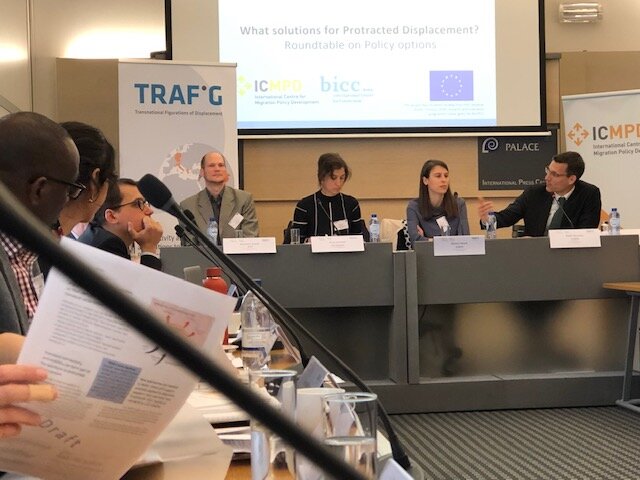Events
Policy Roundtable in Brussels \ What solutions for Protracted Displacement?
The policy roundtable “What solutions for Protracted Displacement?” was organised on 22 May 2019 in Brussels by the International Centre for Migration and Policy Development (ICMPD) and BICC.

This event provided a space for 36 participants from a variety of sectors, including EU institutions, governments, civil society organizations, think-tanks, and academia to discuss possible policy options and solutions to protracted displacement. During the event, stakeholders contributed to the discussion with their perspectives and knowledge on policy development and perspectives on how to address the needs of refugees and IDP’s in conjunction to their host communities.
Considering that protracted displacement situations last an average of 26 years, and in many cases far longer, strategies must operate on a multi-level and multi-partner basis in order to be effective. Because of their unique position, transnational communities have a particularly crucial role to play in the preparation processes for crisis responses and information and support provisions for displaced communities. Participants at the roundtable also agreed on the general necessity to work towards a needs-based approach that addresses the vulnerabilities of those concerned, irrespective of the category they belong to – IDPs, refugees, migrants (in countries of crisis), or local host communities, while upholding access to protection of those in need.
During the roundtable, ICMPD’s recent study, co-funded by OFID, “Bridging refugee protection and development: Policy recommendations for applying a development-displacement nexus approach” was presented which explores ways to construct effective strategies in the implementation of a development-displacement approach. It acknowledges that strategies should be uniquely tailored in accordance with the features of each individual situation, while keeping in mind important lessons learned from major middle-income refugee-hosting countries, namely Jordan, Lebanon and Turkey. As recognised by the EU’s framework on forced displacement and development “Lives in Dignity: from Aid-dependence to Self-reliance”, an indispensable approach to protracted displacement comes in the form of a shift from humanitarian assistance, which provides some short-term relief, to development assistance, which includes a projected plan and long-term funding for certain development goals.
The roundtable was organised in the framework of the EU-funded Horizon 2020 research project “Transnational Figurations of Displacement” (TRAFIG) which will investigate long-lasting displacement situations at multiple sites in Asia, Africa and Europe and analyse options to improve displaced people’s lives.
Press release "Policy Roundtable in Brussels \ What solutions for Protracted Displacement?"
Considering that protracted displacement situations last an average of 26 years, and in many cases far longer, strategies must operate on a multi-level and multi-partner basis in order to be effective. Because of their unique position, transnational communities have a particularly crucial role to play in the preparation processes for crisis responses and information and support provisions for displaced communities. Participants at the roundtable also agreed on the general necessity to work towards a needs-based approach that addresses the vulnerabilities of those concerned, irrespective of the category they belong to – IDPs, refugees, migrants (in countries of crisis), or local host communities, while upholding access to protection of those in need.
During the roundtable, ICMPD’s recent study, co-funded by OFID, “Bridging refugee protection and development: Policy recommendations for applying a development-displacement nexus approach” was presented which explores ways to construct effective strategies in the implementation of a development-displacement approach. It acknowledges that strategies should be uniquely tailored in accordance with the features of each individual situation, while keeping in mind important lessons learned from major middle-income refugee-hosting countries, namely Jordan, Lebanon and Turkey. As recognised by the EU’s framework on forced displacement and development “Lives in Dignity: from Aid-dependence to Self-reliance”, an indispensable approach to protracted displacement comes in the form of a shift from humanitarian assistance, which provides some short-term relief, to development assistance, which includes a projected plan and long-term funding for certain development goals.
The roundtable was organised in the framework of the EU-funded Horizon 2020 research project “Transnational Figurations of Displacement” (TRAFIG) which will investigate long-lasting displacement situations at multiple sites in Asia, Africa and Europe and analyse options to improve displaced people’s lives.
Press release "Policy Roundtable in Brussels \ What solutions for Protracted Displacement?"


